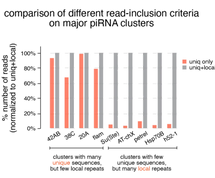Publications
As the first & corresponding author:
2025
Chen P, Pan KC, Park EH, Luo Y, Lee YCG, Aravin AA.
Escalation of genome defense capacity enables control of an expanding meiotic driver.
PNAS 122 (2):e2418541122. PDF (first appeared on bioRxiv)
https://doi.org/10.1073/pnas.2418541122
We discovered a new genome defense factor that we called "Trailblazer", which led us to propose a new mode of innovation in evolutionary battles between selfish genetic elements and host defense pathways.
Highlighted in a spotlight article
by Emiliano Martí & Amanda Larracuente.
Trends Genet 41(5):359-361. PDF
https://doi.org/10.1016/j.tig.2025.03.001
2023
Chen P, Aravin AA.
Genetic control of a sex-specific piRNA program.
Curr Biol 33(9):1825-1835.e3. PDF (first appeared on bioRxiv)
https://doi.org/10.1016/j.cub.2023.03.057
We developed a powerful set of genetic tools to uncouple sex chromosomes from sex determination, using which we dissected their distinct contributions towards a sexually dimorphic trait—the piRNA program.
Highlighted in a dispatch article
by Caitlin Pozmanter & Mark Van Doren.
Curr Biol 33(11):R442-R444. PDF
https://doi.org/10.1016/j.cub.2023.04.001
2021
Chen P, Luo Y, Aravin AA.
RDC complex executes a dynamic piRNA program during
Drosophila spermatogenesis to safeguard male fertility.
PLoS Genet 17(9):e1009591. PDF (first appeared on bioRxiv)
https://doi.org/10.1371/journal.pgen.1009591
We elucidated the molecular mechanisms by which piRNAs are transcribed in the male germ line, and we showed that the RDC protein complex—once thought to be female-specific—is actually active in males but exhibits sex-specific, dynamic behaviors.
Highlighted in a perspective article
by Anahi Molla Herman and Emilie Brasset.
PLoS Genet 17(9):e1009702. PDF
https://doi.org/10.1371/journal.pgen.1009702
2021
Chen P, Kotov AA, Godneeva BK, Bazylev SS, Olenina LV, Aravin AA.
piRNA-mediated gene regulation and adaptation to sex-specific transposon expression in D. melanogaster male germline.
Genes Dev 35(11-12):914-935. PDF (first appeared on bioRxiv)
https://doi.org/10.1101/gad.345041.120
We systematically defined piRNAs in the fly testis for the first time, uncovered substantial piRNA sexual dimorphism, and discovered a new paradigm of piRNA-mediated gene regulation, where the X-linked "pirate" gene is silenced by the Y-linked "petrel" piRNAs.
Fun fact: we named these piRNAs
"petrel", because it refers to a type
of seabird whose appearance predicts
bad weather on the ocean. Seeing
petrel birds (the piRNAs) must be
terrible news for pirates—coz it tells
them that the storm is coming!
Highlighted on the journal cover
(art by Frank Macabenta)





As a co-author:
2023
Venkei ZG, Gainetdinov I, Bagci A, Starostik MR, Choi CP, Fingerhut JM, Chen P, Balsara C, Whitfield TW, Bell GW, Feng S, Jacobsen SE, Aravin AA, Kim JK, Zamore PD, Yamashita YM.
A maternally-programmed intergenerational mechanism enables male offspring to make piRNAs from Y-linked precursor RNAs in Drosophila.
Nat Cell Biol 25(10):1495-1505. PDF (first appeared on bioRxiv)
https://doi.org/10.1038/s41556-023-01227-4
In this collaboration paper, we described a novel mechanism by which transposon-derived piRNAs can act intergenerationally to initiate the piRNA production from a Y-linked locus.
Commentary
2021
Chen P, Aravin AA.
Transposon-taming piRNAs in the germline: Where do they come from?
Mol Cell 81(19):3884-3885. PDF
https://doi.org/10.1016/j.molcel.2021.09.017
We highlighted a recent paper from the group of Felipe Karam Teixeira that challenged the dogma in the field about genomic origins of transposon-taming piRNAs.
